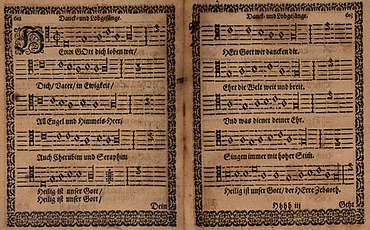Lord God, we praise you (Luther)
Lord God, we praise you (also called the German Te Deum ) is a liturgical alternating song, the text and music of which was written by Martin Luther . It is based on the medieval Te Deum and first appeared in print in 1529. In the Evangelical Hymn book it is under No. 191.
history
There is no known information about the history of its origins. The song was first printed in the Spiritual Songs by Joseph Klug in 1529 in Wittenberg . No copy of this edition has survived. The oldest surviving edition is that of 1533.
Because of its Augustinian character, Luther already valued the Te Deum, which, according to legend, was composed as an alternating song between Ambrosius and Augustine . He counted it next to the Apostolicum , the Niceneum and the Athanasianum to the basic confessions of the church. His composure, Lord God, we praise you , is seldom sung in Protestant worship.
text

Luther took the Latin Te Deum from the 5th century as a template and formed it into an alternating chant in rhyming pairs with six syllables at the beginning and then eight syllable throughout. The Latin model was perhaps written by Nicetas of Remesiana , later incorrectly attributed to Ambrosius of Milan .
| I. |
II |
|
Lord God, we praise you, |
Lord God we thank you. |
|
I and II are |
|
|
Your divine power and glory |
goes far over heaven and earth. |
|
I and II |
|
music
Martin Luther used a simple version of the Gregorian Te Deum and changed it slightly. The highlighting of two lines of text with double note values is significant: "Now help us, Lord, the servants of yours who have been redeemed with your precious blood" - here kneeling was common in the Catholic liturgy - and the final request "Hope in you." we, dear Lord, never leave us in disgrace ”.
Along with other composers, Johann Sebastian Bach arranged the vocals in cantatas 16 , 120 and 190 and Felix Mendelssohn Bartholdy as the choral cantata MWV A 20.
literature
- Hans-Christian Drömann : 191 - Lord God, we praise you (Te Deum) . In: Gerhard Hahn , Jürgen Henkys (Hrsg.): Liederkunde zum Evangelisches Gesangbuch . No. 6/7 . Vandenhoeck & Ruprecht, Göttingen 2003, ISBN 3-525-50330-X , p. 107–115 ( limited preview in Google Book search).
- Wilhelm Lucke: The songs of Luther (= Weimar Luther edition. Volume 35). Böhlau, Weimar 1923, pp. 249-254 ( Textarchiv - Internet Archive ).
Web links
- Chorale Melodies used in Bach's Vocal Works: Lord God, we praise you , bach-cantatas.com (English)
Remarks
- ↑ See his work The Three Symbols or Confessions of the Faith of Christ, used in the Church in harmony from 1538
- ↑ Drömann p. 108
- ↑ The following text according to EG 191. Father, angel, heaven, king are partly understood as monosyllabic.
- ^ Gregorian Te Deum
- ↑ Lord God, we praise you Melody, Luther Society eV (pdf)
- ↑ Lord God, we praise you to the melody on colmarisches.free
- ↑ cf. Florentius Schilling: Sunday sermons or Penuarium quadragesimale. Johann Hoffmann, Sulzbach 1681, pp. 113–114 ( digitized in the Google book search).
